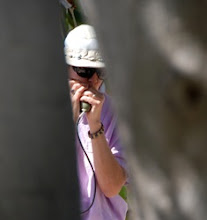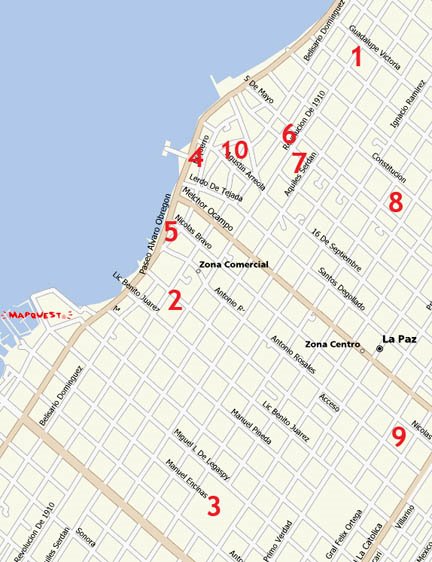 HOME-GROWN
HOME-GROWNWalk along the the seawall of La Paz on a Saturday night, past the promenade of cars on Calle Obregón, and you’ll likely hear the steady beat of norteño music —the sound of accordion and 12-string guitar, the lyrics of jilted lovers, illegal immigrants and the lives of everyday people. These bands are popular in Baja California Sur.
Paulo Piña offers something different. The 27-year-old is a singer-songwriter who was born and raised in La Paz. His parents are scientists; his older sister Calafia is an actress and playwright. Those strands of family influence are woven into his music.
So are his experiences from university days in Veracruz, where he studied music. He soaked in Argentinian Rock from the 1970s, jazz, English-language pop and Bossa Nova. The result is a newly released CD: Canciones que Hablaban de Nosotros (Songs that Speak of Us). He writes about history, science, childhood memory and, of course, love. The lyrics are complex. But you don’t need to understand the words to enjoy his latin rhythms and haunting melodies. He describes this brand of music as “latin pop fusion neosudcaliforniano.”
From El Son de los Pollitos (the 'son' – a style of music – of the chicks):
Todas las historias se mesclan a una misma historia
All the stories mix together to become the same story
Piña wants to challenge the influence of U.S.-style grunge and punk (“It’s not bad, but it’s not Mexican”) and the pervasiveness of those norteño bands. More than that, he says he is trying to revitalize the cultural scene in La Paz.
“In Veracruz, Mexico City, Puebla and Oaxaca, people have more love of their own culture, for their traditions. Here, no,” Piña says. Our conversation is in Spanish, translated and summarized here. “The people in Veracruz or in Mexico City are disposed to sit and listen to something calmly, with attention, or to see a painting, or to read. What’s most important is that people here in la Paz see that there is a new option, something different.”
He says it’s not a matter of imposing music from elsewhere. “It must be from Baja California, our own, nothing else. And if there are young people who like this, then surely they’ll listen more to some different music such as bossa nova, to hear more critically, to not accept just anything.” From that, he hopes, a homegrown cultural identity will develop.
From the song Calafia (a reference not to his sister, but to Baja California):
Bancos de marlyn cruzaron las sombras de los barcos hundidos
Los campamentos de esos pescadores guardan secretos de insomnes caletas
Schools of marlin cruised the shadows of the sunken boats
The camps of those fishermen guard secrets of sleepless inlets
In addition to preparing songs for a second CD, Piña is composing music for stage and screen. His sister Calafia has produced a one-woman theatrical work, El Caminante (The Traveller). Calafia plays all five characters during this intense performance. Paulo, one year younger, provides the solo musical accompaniment live. The next performance of El Cominante in La Paz is at El Teatro de la Ciudad, April 15, 7 p.m.
From Sopa de tomate (Tomato Soup):
Niña, te recuerdo atrás del árbol, juegos de pelota en el jardín....
Juegos de memoria y barquitos de papel, sopa de tomate derramada en la tarea
I remember you, little girl, behind the tree, ballgames in the garden...
Memory games and little paper boats, tomato soup spilled on the homework
You can hear Piña's music from the CD Canciones que Hablaban de Nosotros online by clicking on the following link:
http://profile.myspace.com/index.cfm?fuseaction=user.viewprofile&friendid=340853246
His disc, made with support from cultural agencies of Baja California Sur, can be purchased through the website or from the music store in the Soriana shopping mall.
From the song Calafia (a reference not to his sister, but to Baja California):
Bancos de marlyn cruzaron las sombras de los barcos hundidos
Los campamentos de esos pescadores guardan secretos de insomnes caletas
Schools of marlin cruised the shadows of the sunken boats
The camps of those fishermen guard secrets of sleepless inlets
In addition to preparing songs for a second CD, Piña is composing music for stage and screen. His sister Calafia has produced a one-woman theatrical work, El Caminante (The Traveller). Calafia plays all five characters during this intense performance. Paulo, one year younger, provides the solo musical accompaniment live. The next performance of El Cominante in La Paz is at El Teatro de la Ciudad, April 15, 7 p.m.
From Sopa de tomate (Tomato Soup):
Niña, te recuerdo atrás del árbol, juegos de pelota en el jardín....
Juegos de memoria y barquitos de papel, sopa de tomate derramada en la tarea
I remember you, little girl, behind the tree, ballgames in the garden...
Memory games and little paper boats, tomato soup spilled on the homework
You can hear Piña's music from the CD Canciones que Hablaban de Nosotros online by clicking on the following link:
http://profile.myspace.com/index.cfm?fuseaction=user.viewprofile&friendid=340853246
His disc, made with support from cultural agencies of Baja California Sur, can be purchased through the website or from the music store in the Soriana shopping mall.
In addition to accompanying his sister in El Caminante, Piña has several concert dates set for La Paz. Because of support from government cultural agencies, these concerts are free. Information on how to find the venues is in the left-hand column of this blog:
April 18: Escuela de Música del Estado, 7pm
April 26, Jardin Velasco, 7pm
May 21: UABCS, 6pm
June 8, Jardin Velasco, 7:30pm
June 22, kiosk on the Malecón, 8pm
July 22, kiosk on the Malecón
Piña plays with sounds and meaning in his lyrics. He creates words. And the melody, itself, sometimes embodies the message. Take, for example, his song Aleluya Newtoniana (Hallelujah, Newtonion – relating to Sir Isaac Newton and scientific theories such as that on gravity).
Piña explains that his intent in the song is to juxtapose science and art. “The idea of ‘Hallelujah’ is religious. In the baroque classics, composers used very high notes because they felt it brought them closer to heaven,” he says. “On the other hand, there are the theories of Newton, his apple and the forces of gravity." The lyrics mix science and religion; the music rises and falls.
I don’t pretend the lyrics are crystal clear to me, but I like the song.
From Aleluya Newtoniana (Hallelujah, Newtonion):
Con la fuerza caí de gravidad
Con el cause viajé del río hasta la ciudad
Y en cascada voy burlando poco a po
Condiciones adversas
Luna lullaby la locomía de aleluya newtoniana
My rough translation (if you find locomía in a dictionary, let me know)
With the force of gravity I fell
With the riverbed I traveled from the river to the city
And into the waterfall I go, mocking, little by little,
Adverse conditions
Moon (loony?) lullaby -- the “craziness” of Hallelujah, Newtonion


